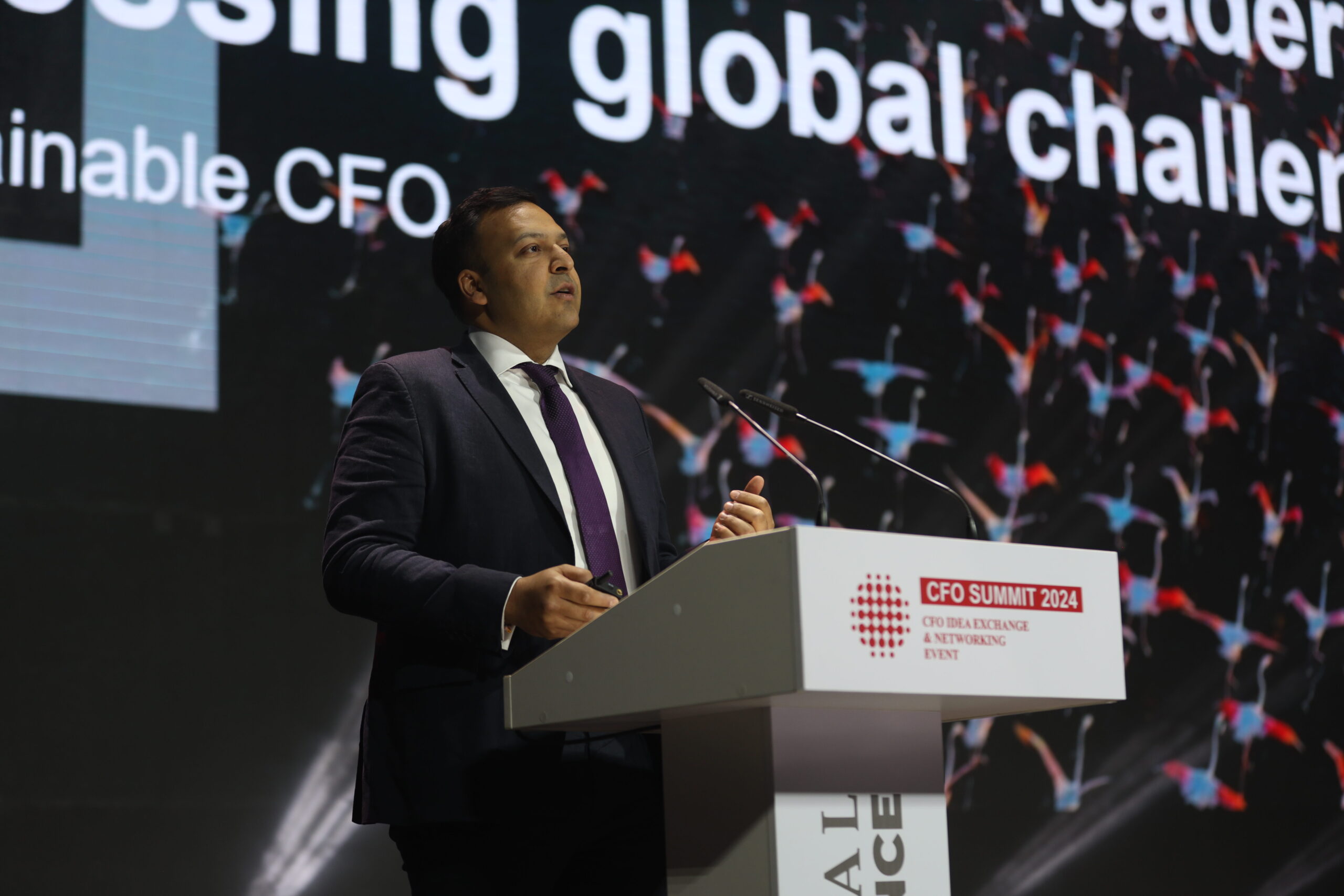ASTANA – Sustainability reporting with broader value and upskilling is to play a key role in sustainable development of Kazakh companies in accordance with environmental, social and governance (ESG) standards, said Vikas Aggarwal, regional head of public affairs for Europe, Eurasia, Middle East and the Americas at the Association of Chartered Certified Accountants (ACCA) in an interview with The Astana Times.

Vikas Aggarwal during the Chief Financial Officer (CFO) Summit 2024 in Almaty. Photo credit: ACCA press office.
ACCA is a membership body that accredits and supports professional accountants all over the world. With a network of 117 offices and centres globally, it creates excellent accountancy qualifications. It is also among the organizations focused on raising levels of sustainable governance and reporting in the region.
“The accountancy profession has a vital role to play in driving positive change and helping organizations create long-term value through their operations within ecological, social, and economic environments,” said Aggarwal, who attended the Chief Financial Officer (CFO) Summit in Almaty on March 14.
Organized by the Kazakhstan Growth Forum since 2014, the annual CFO summit brings together the country’s business representatives to create a strategic business vision among domestic managers and business owners.
Rethinking corporate reporting will ensure the effective implementation of sustainability objectives. The path to a sustainable future lies in the hands of finance teams, Aggarwal said, emphasizing the need for ongoing education and skills development.
“The evolving role, skills, judgment, and all-round data-informed view of professional accountants means that they can make invaluable contributions to the efforts of organizations and the society at large in transitioning to a more sustainable economy,” he added.
According to Aggarwal, any sustainability strategy requires appropriate reporting. “It is about driving transparency, measurability, and comparability—it is ultimately about trust and giving stakeholders an understanding of their organization’s role in society,” he said.
He observes how investors, regulators, employees, and stakeholders increasingly demand detailed sustainability disclosures.
“Measurement and disclosure are needed for better decision-making which will enable more stable, resilient markets with less abrupt price adjustments and facilitate a smoother transition to a low-carbon economy. ACCA encourages the application of the International Sustainability Standards Board (ISSB) standards, particularly International Financial Reporting Standards (IFRS) S2 Climate-related Disclosures, for measuring and disclosing climate-related risks and opportunities,” he explained.
Advice on sustainability reporting
Central to this innovative reporting approach is diversifying team perspectives and experiences. Aggarwal recommends that Kazakh companies expand their understanding of value to advance sustainability.
“The concept of value is one which organizations are increasingly being asked to consider by their various stakeholders. This is giving rise to the concept of a chief value officer (CVO) as the individual accountable for the creation and measurement of value, while the chief financial officer (CFO) and their team are increasingly focusing on a broader view of performance,” said Aggarwal.
He also urges the companies to focus on measuring and disclosing climate-related risks, advancing towards sustainability reporting, as well as embedding sustainability in all processes. The expert cited the organization’s latest report, Sustainability in Transactions, which “identified significant risks associated with an organization’s journey towards a sustainable operating model.”
“Sustainability-related opportunities and risks cannot be ignored in a transaction: they now form a fundamental part of the strategic intent of the transaction and the valuation of an entity. The assessment of these risks and opportunities must be comprehensively considered as part of the due diligence process, both as a specific workflow and as an integral part of other forms of due diligence,” said Aggarwal.
“In ACCA, we support incentives for small and medium-sized enterprises (SMEs) to adopt sustainability and disclosure standards. At present, SMEs face the greatest challenge in terms of upskilling, education, and capacity constraints,” he added.
He also advised companies to support capacity building.
“Investing in education and training of professionals involved in policy-making and enforcement is key for effective implementation. The goal is not to make all accountancy and finance professionals into ESG experts but to raise our general knowledge level so that we can effectively work with others in organizations and with experts in advising clients and in performing assurance engagements that reach both limited and reasonable assurance conclusions,” said Aggarwal.
As companies gradually transition to sustainability reporting, it is also important to promote improved information management and incentivize the transition from estimates to primary data.
“Relying on alternative data sources and methods for emissions estimation and data compilation results in non-standardization, inaccuracy and inconsistency in emissions reporting across firms, raising concerns regarding comparability for investors, customers and regulators,” said Aggarwal.
“As investors and customers demand increased transparency regarding net-zero commitments, the necessity to rely on primary data is rapidly becoming a reality. New forms of geospatial data and analysis, including the introduction of ‘spatial finance’ and ‘asset-level data’, that improve the theory and practice of measuring environmental risks and impacts are examples of best practice we have come across,” he added.
He further suggested expanding the scope of sustainability disclosures beyond climate-related risks.
“There is a growing recognition of other ESG factors that can significantly impact a company’s performance and long-term value. The ISSB’s future priorities include biodiversity, human capital, human rights, and integration in reporting. This indicates the board’s commitment to addressing a broader range of ESG matters in the future,” said Aggarwal.
The implications of the current challenges in the sustainability arena for professional accountants are substantial, according to him.
“So, the finance function of the future is not just about finance. It is about performance in its many senses,” said Aggarwal.
This includes the ethical conduct of business, considering the welfare of employees, value chain partners, customers, and communities. “And we must be at the forefront of this change: we either shape the agenda, or we can let the agenda shape us,” he added.

